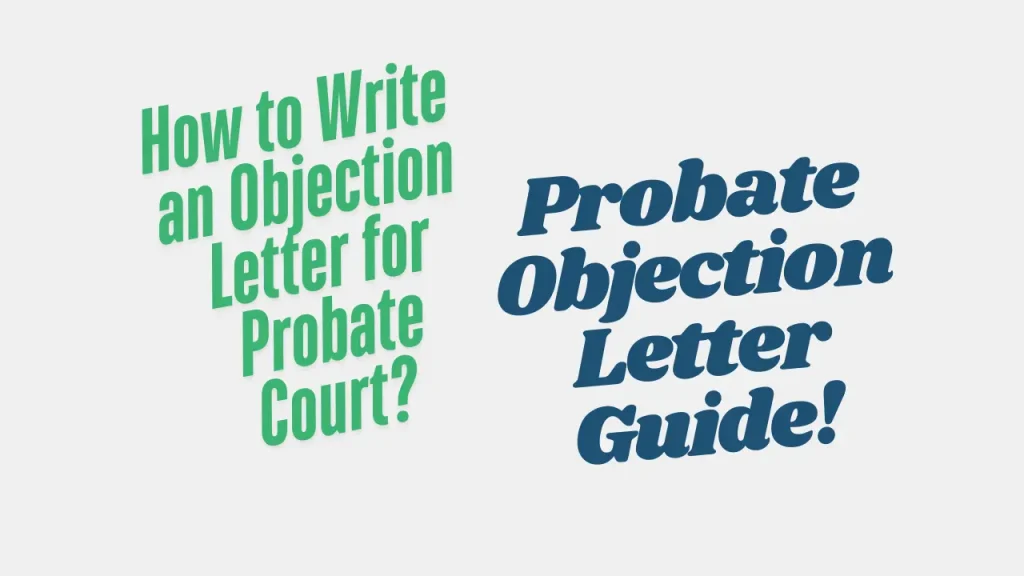How to Write an Objection Letter for Probate Court? Probate Objection Letter Guide!
When disputes arise over a loved one’s estate—whether due to a contested will, executor misconduct, or unfair asset distribution—filing a well-structured objection letter can be a crucial step in protecting your rights. A properly drafted objection not only pauses the probate process but also provides an opportunity to present evidence and challenge any irregularities. In this guide, you’ll learn how to craft a persuasive objection letter that meets legal standards and strengthens your case in probate court.
Table of Contents
When to File a Probate Objection
You can object to:
- The validity of the will (e.g., forged signatures, lack of capacity).
- Executor misconduct (e.g., mismanaging assets, conflicts of interest).
- Incorrect asset distribution (e.g., omitted heirs, undisclosed property).
- Undue influence or fraud (e.g., coercion by a caregiver or relative).
Deadline Alert: Most states require objections within 10–30 days of probate notice. For example:
- California: 30 days after probate notice (Probate Code § 8250).
- Texas: 14 days after executor appointment (Estates Code § 256.052).
Step 1: Format Your Objection Letter Correctly
Use a formal business letter structure:
- Court Details: Address the letter to the probate court handling the case.
- Your Contact Info: Name, address, phone, email.
- Case Information: Decedent’s name, case number, and county.
- Subject Line: “Objection to Probate of the Estate of [Decedent’s Name].”
Example Header:
[Your Name]
[Your Address]
[City, State, ZIP]
[Date]
Probate Court of [County Name]
[Court Address]
[City, State, ZIP]
RE: Objection to Probate of the Estate of [Decedent’s Name]
Case No.: [Insert Number]
Step 2: State Your Grounds for Objection Clearly
Be specific and reference state law. Avoid emotional language—stick to facts.
Sample Language:
“I, [Your Name], hereby formally object to the probate of the Last Will and Testament of [Decedent’s Name], dated [Date], on the grounds of undue influence under [State Code, e.g., Florida Statutes § 732.5165]. The decedent was coerced by [Name] into altering their estate plan, as evidenced by [Briefly Describe Evidence].”
Step 3: Attach Evidence
Support your claims with documentation. Include:
- Affidavits from witnesses (e.g., notarized statements about the decedent’s mental state).
- Medical records showing incapacity.
- Previous wills or estate plans.
- Financial records (e.g., sudden asset transfers).
Label attachments clearly:
“Attached:
- Exhibit A: Affidavit of Dr. Jane Doe, dated 10/15/2023
- Exhibit B: Bank statement showing unauthorized withdrawal”
Step 4: Request a Hearing
Ask the court to schedule a hearing to review your objection.
Example:
“Pursuant to [State Law, e.g., Texas Estates Code § 55.001], I respectfully request a hearing to present evidence supporting this objection.”
Step 5: Sign and File
- Sign the letter in front of a notary if required by your state.
- File copies with the court and serve the executor/heirs (certified mail or process server).
- Keep proof of service (e.g., a certified mail receipt).
Common Mistakes to Avoid
- Missing Deadlines: Calendar your state’s objection window.
- Vague Claims: “The will seems unfair” won’t work—cite specific laws and evidence.
- Ignoring Local Rules: Some courts require forms (e.g., Florida’s “Objection to Petition for Administration”).
- Emotional Language: Focus on legal arguments, not personal grievances.
Related article for you:
Are Joint Accounts Subject to Probate? Rules, Risks & Best Alternatives

Deadlines by State:
| State | Deadline to Object | Statute |
| California | 30 days after notice | Probate Code § 8250 |
| Texas | 14 days after appointment | Estates Code § 256.052 |
| Florida | 90 days after probate | Fla. Stat. § 733.212 |
Sample Objection Letter Template
[Your Name]
[Your Address]
[Date]
Probate Court of [County]
[Address]
RE: Objection to Probate of the Estate of [Decedent’s Name]
Case No.: [Number]
Dear Clerk/Court:
I, [Your Name], hereby formally object to [specific aspect of probate, e.g., “the appointment of John Doe as executor”].
**Grounds for Objection**:
1. [Reason 1 with legal reference, e.g., “The executor has a conflict of interest under [State Code]”].
2. [Reason 2 with evidence, e.g., “Attached medical records show the decedent lacked testamentary capacity”].
**Request for Relief**:
I ask the court to [state desired outcome, e.g., “invalidate the will dated 1/1/2023” or “appoint a neutral administrator”].
Please schedule a hearing at the court’s earliest convenience.
Sincerely,
[Your Signature]
[Your Printed Name]
Attachments:
– Exhibit A: [Description]
– Exhibit B: [Description]
What Happens Next?
- The court will notify all parties and schedule a hearing.
- Prepare to present evidence (witnesses, documents).
- Consider hiring a probate attorney—complex cases often require legal expertise.
Critical Mistakes to Avoid
- Missing Service Rules:
- California: Serve all heirs via certified mail (CRC 5.125).
- New York: Use a process server for objections (SCPA § 1412).
- Ignoring Local Forms:
- Florida: File a “Petition for Administration” alongside your objection.
- Ohio: Use Form 19.0 for will contests.
- Failing to Notarize: Some states (e.g., Arizona) require notarized objections.
Resources for Help
- State Probate Courts:
- California: California Courts Probate Forms
- Texas: Texas Law Help Probate Guides
- Legal Aid:
- Free/low-cost help: Legal Services Corporation
- Templates:
Why You Might Need an Attorney
Complex cases involving high-value estates or cross-state issues often require legal firepower. Attorneys can:
- Subpoena bank records.
- Depose witnesses.
- Review the Uniform Probate Code (UPC) nuances.
Final Takeaway
A probate objection letter is your first strike in protecting your inheritance rights—but precision matters. Use this guide’s templates, adhere to state laws, and act swiftly. For contested estates over $500K or multi-state assets, consult a probate attorney to avoid missteps.
About the Author

Sarah Klein, JD, is an experienced estate planning attorney who has helped clients with wills, trusts, powers of attorney, and probate matters. At All About Lawyer, she simplifies complex estate laws so families can protect their assets, plan ahead, and avoid legal headaches during life’s most sensitive moments.
Read more about Sarah
